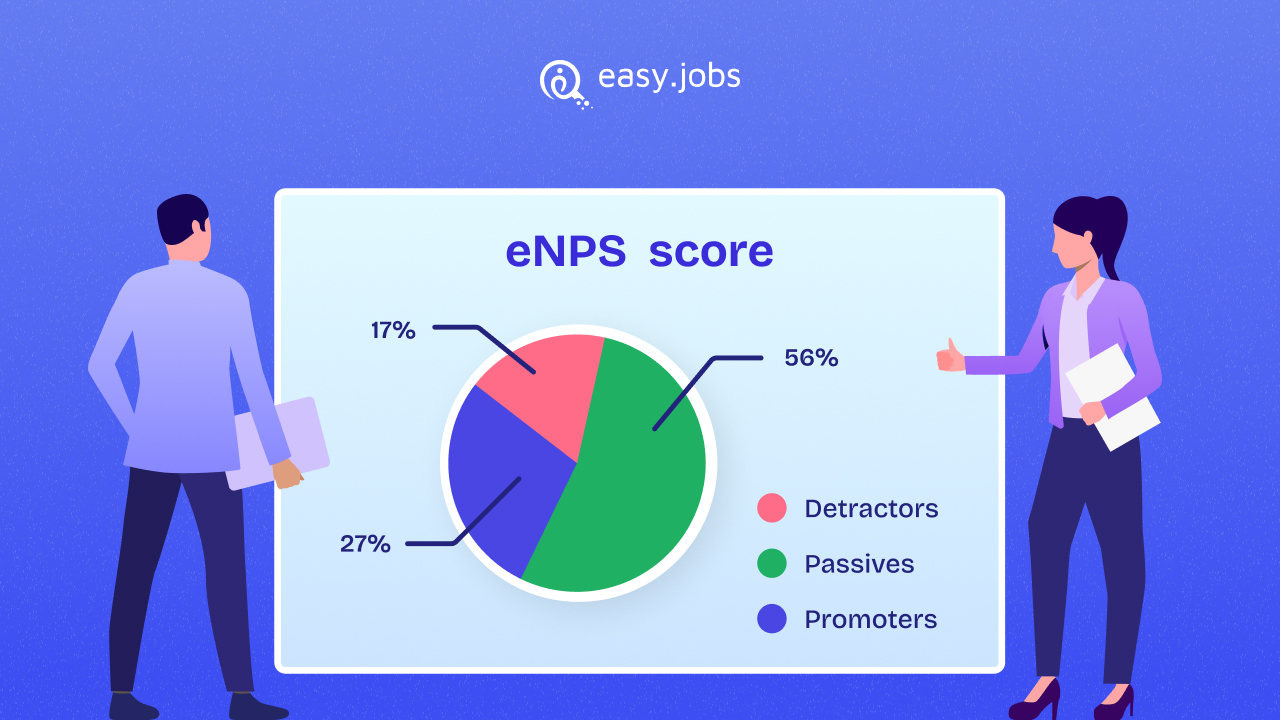All the reputed organizations out there are trying to conduct regular eNPS surveys. If you want to upscale your organization’s value and growth, you must start asking the correct eNPS questions and analyze them. But what are the must-have eNPS questions that you must include in your survey? Start reading this blog if you want to know more.

What is eNPS?
eNPS stands for Employee Net Promoter Score. It is a metric used by organizations to measure the loyalty and satisfaction of their employees. Employee engagement, satisfaction, loyalty, and the likelihood that staff members will suggest the company to their personal networks as a great place to work are all measured by employers using an eNPS. Its foundation is the 2003 Bain & Company net promoter system, which gauges customer loyalty and satisfaction and tells businesses how likely it is that a given customer will tell their friends and family about a product or service.
How Does eNPS Work?
Employees are asked simple, straightforward questions like this: “On a scale of 0 to 10, how likely are you to recommend this company as a place to work to a friend or colleague?”
Then we classify the responses based on scale below:
- Promoters (9-10): Employees who are highly satisfied and likely to recommend the company. They are seen as loyal and enthusiastic.
- Passives (7-8): Employees who are satisfied but not necessarily enthusiastic. They may be ambivalent and are considered neutral.
- Detractors (0-6): Employees who are dissatisfied and unlikely to recommend the company to their networks. They may be disengaged or unhappy with their work environment.
How to Calculate eNPS?
The eNPS is calculated by subtracting the percentage of Detractors from the percentage of Promoters. The formula is:
eNPS = %Promoters − %Detractors
If 60% of employees are Promoters, 20% are Passives, and 20% are Detractors, the eNPS would be:
eNPS=60%−20%=40%
Interpretation of eNPS
- Positive eNPS: Indicates more Promoters than Detractors, suggesting a generally positive sentiment among employees.
- Negative eNPS: Indicates more Detractors than Promoters, suggesting potential issues with employee satisfaction and loyalty. This is in direct contrast to Positive eNPS.
- High eNPS: Generally indicates strong employee engagement, satisfaction and a healthy workplace culture.
- Low eNPS: Signals potential areas for improvement in terms of employee experience and engagement.
What Are the Benefits of eNPS Survey?
Conducting an eNPS survey provides numerous advantages for organizations aiming to gauge and improve employee satisfaction and engagement. By asking the right eNPS questions, companies can gain valuable insights into their workforce’s overall sentiment and identify improvement areas.
1. Develop a Simple & Efficient Feedback Mechanism
The survey typically involves one straightforward eNPS question: “On a scale of 0 to 10, how likely are you to recommend this company as a place to work to a friend or colleague?” This simplicity ensures high response rates, providing a quick and efficient way to gather feedback from employees without overwhelming them.
2. Provide Clear And Actionable Insights
The responses to eNPS questions are easy to quantify and interpret, offering a clear indication of employee satisfaction and loyalty. By categorizing responses into Promoters, Passives, and Detractors, organizations can pinpoint specific groups that require attention and develop targeted strategies to address their concerns.
3. Identify Organizational Strengths And Weaknesses
The feedback collected through eNPS questions highlights both the strengths and weaknesses of the workplace environment. Understanding what employees value most and what areas need improvement helps management maintain a positive work culture and address issues proactively.
4. Enhance Employee Engagement
eNPS surveys signal to employees that their opinions matter and that the organization is committed to improving their work experience. This can boost overall employee engagement, as workers feel heard and valued, leading to higher morale and productivity.
5. Support Retention And Recruitment Efforts
High eNPS scores reflect a positive workplace environment, making it easier to retain current employees and attract new talent. Potential recruits often consider current employees’ satisfaction levels when deciding whether to join an organization and a high eNPS can serve as a powerful recruitment tool.
![How to Do Employee Happiness Survey [20 Questions & Analysis Process] 1 eNPS Questions](https://easy.jobs/wp-content/uploads/2024/06/EJ-How-to-conduct-Employee-Happiness-Survey-10-Questions-Analyze-Process.jpg)
20 eNPS Questions To Ask in Your Next eNPS Survey [with Explanation]
Including well-researched eNPS questions in your survey gives you a deeper understanding of employee sentiment than just the basic eNPS score. Each question focuses on a particular facet of the employee experience and provides HR departments with. This useful information helps you cultivate a workforce that is more engaged, content, and devoted.
1. On a scale of 0 to 10, how likely are you to recommend this company as a place to work to a friend or colleague?
It is a core, fundamental eNPS question that should be in every survey. This eNPS question provides the baseline metric for employee satisfaction and loyalty.
2. What is the primary reason for your score?
This eNPS question helps to understand the rationale behind their rating and identify specific strengths and weaknesses.
3. What do you enjoy most about working here?
You can Identify key positive aspects of the workplace that should be maintained or enhanced by adding this eNPS question to your survey.
4. What improvements would you suggest to make this company a better place to work?
Gather actionable feedback on areas needing improvement from the answer to this question.
5. Do you feel your contributions are valued here?
This eNPS question will measure whether employees feel recognized and appreciated, impacting their loyalty and satisfaction.
6. How would you rate your work-life balance?
This eNPS question asks you to assess the efficacy of practices and policies that support a healthy work-life balance.
7. Do you have the tools and resources needed to do your job effectively?
You can assess whether employees feel adequately equipped to perform their duties with this eNPS question.
8. How would you rate the effectiveness of communication within the company?
This question helps you identify potential communication gaps that may affect employee engagement and productivity.
9. Do you feel you have opportunities for professional growth and development here?
You can easily determine if employees see a future with the company, which is critical for retention, by adding this question.
10. How would you describe the company’s culture?
This eNPS question offers insights into how workers view the culture and working environment.
11. Do you feel the company’s leadership communicates a clear vision?
Make sure to ask your employees to be descriptive while answering this question. It will help to measure leadership effectiveness in inspiring and guiding employees.
12. Are you satisfied with the level of support you receive from your manager?
You can evaluate managerial effectiveness and supportiveness, crucial for employee satisfaction from the answers to this eNPS question.
13. How likely are you to stay with the company for the next year?
The answer to this eNPS question helps you predict potential turnover and helps identify retention issues.
14. Do you feel your work is aligned with the company’s goals and objectives?
By adding up each employee’s response to this eNPS question, you can make sure that workers are aware of their contributions to the company’s success.
15. How satisfied are you with your compensation and benefits?
You can add this eNPS question to assess whether employees feel fairly compensated, which affects overall satisfaction and retention.
16. Do you feel there is a clear path for advancement within the company?
From the answers to this question, you can measure the perceived availability of career growth opportunities.
17. How inclusive and diverse do you find our workplace?
Evaluate the company’s effectiveness in fostering a diverse and inclusive work environment by analyzing the answers to this eNPS question.
18. Do you feel safe and comfortable in your work environment?
This eNPS question’s answer will assess physical and psychological safety at work, which is vital for employee well-being.
19. How likely are you to recommend our products/services to others?
You can easily gauge employees’ belief in the company’s offerings, reflecting their overall engagement and pride from the answers to this eNPS question.
20. What would make you more satisfied and engaged at work?
This eNPS question directly seeks suggestions for enhancing employee satisfaction and engagement.
💡Bonus: List of Employee Survey Templates & Questions You Should Check out
- How to Create Self Evaluation Form & Measure Employee Growth
- How to Do Employee Happiness Survey [20 Questions & Analysis Process]
- 20 Behavioral Interview Questions to Prepare For
- 20+ Interesting Interview Questions to Learn About Commitment & Motivation
- 15+ Exit Interview Questions You Should Ask to Improve Your Company
Measure & Boost Employee Satisfaction Rate 🚀
Hopefully, these eNPS questions will help you to analyze the present state of your organization and how you can improve it. Choosing the right eNPS questions for your next survey and conducting regular employee surveys will allow you to determine how satisfied, motivated, and loyal your employees are to your company. Employees who are highly engaged and loyal to the company are more likely to serve as brand ambassadors, assisting you in attracting and recruiting more top talent.
Do you want to keep learning about HR management tips and tricks? Then subscribe to our blog from now on.







